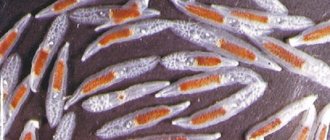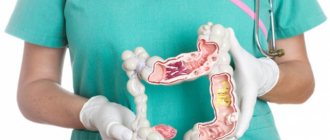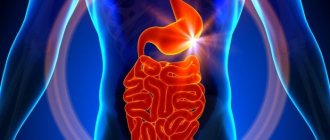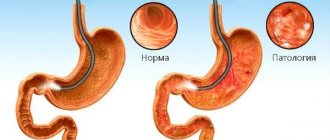Anal discharge: causes and types of discharge
Anal discharge is a fairly common problem.
However, most people are embarrassed and do not turn to a specialist. It is important to understand that mucus from the anus cannot appear without good reason; it is a manifestation of some disease. Mucous contents can be released from the anus due to poor nutrition, poisoning, diseases of the vascular system, and degenerative changes in the rectum. Often, discharge from the anus is complicated by other symptoms: pain in the abdomen, as well as during bowel movements, stool disorders (diarrhea or constipation), itching, increased accumulation of gases. The discharge may have a mucous, bloody, oily or purulent consistency. Mucus can be released either with stool during bowel movements, or spontaneously.
It should be understood that this symptom is not harmless; it may signal the presence of a serious illness. Therefore, if you experience anal discharge, the first thing you need to do is make an appointment with a proctologist. Discharge from the anus (pus, mucus) is more common than blood. There are plenty of reasons for anal discharge. The occurrence of this disease is caused by: the formation of fecal stones, malfunction of the sphincter, rectal prolapse, and muscle damage.
Due to the increased concentration of moisture, skin wrinkling and deep cracks appear. When liquid gets on cracks, it causes irritation, tingling and burning. In addition, the disease can occur due to fistulas, ulcers, cancer, prostatitis, gonorrhea, and prolapse of the intestinal mucosa. In addition, the disease can be triggered by herpes, Crohn's disease, the presence of genital warts, proctitis, hemorrhoids or hemorrhoids.
Due to the accumulation of mucus, the formation of a pathological environment is noted. Sometimes the mucus is mixed with purulent exudate, which has an unpleasant odor. The mucus may be mixed with pus or blood, watery or oily.
Mucus combined with frequent bleeding may indicate internal hemorrhoids, colitis or the presence of fistulas. Mucus can be white, yellow or clear. Discharge is often complicated by diarrhea or constipation, discomfort and flatulence.
Oily discharge
This kind of discharge may not always be a sign of pathology. They can occur as a result of eating fatty foods, oral contraceptives, or taking medications for weight loss.
In this case, the feces are usually quite difficult to wash off the toilet and become slightly shiny. With the regular appearance of oily mucus from the anus, doctors suspect inflammation and disease of the gallbladder or pancreas.
Important! This may also indicate an internal form of hemorrhoids or colitis.
The appearance of oily mucus requires therapy, one of the points of which is proper nutrition. If this type of discharge appears for a long time, it is necessary to visit a specialist and undergo a full examination of the internal organs.
Discharge of mucus and fluid from the anus - diagnosis and treatment of the disease
Discharge of fluid from the anus is a problem that can be encountered by both adults and children.
If mucus appears, seek help from a qualified professional. Timely diagnosis of the disease will contribute to the rapid cure of the disease. As mentioned earlier, different types of fluid can be released from the anus. It can be colorless, white, yellowish, purulent and bloody. This symptom often signals a serious illness. Discharge of mucous fluid from the anus may indicate:
- food poisoning;
- dystrophic changes;
- irritable bowel syndrome;
- complications of surgical interventions;
- presence of deep cracks;
- injuries to the pelvic floor muscles;
- neoplasms;
- fistulas;
- excessive production of bile (mucus has an orange color and an unpleasant odor);
- dysfunction of the sphincter;
- fungal infection (a plaque is observed on the stool);
- hemorrhoids;
- proctitis (chronic or acute).
The release of oily fluid from the anus can be caused by:
- abuse of fatty foods;
- abuse of medications, in particular drugs for weight loss;
- inflammatory lesions of the large intestine;
- the presence of inflammation in the pancreas (pancreatitis), provoked by the abuse of smoked meats, fatty foods, spicy foods and alcoholic beverages;
- the presence of an inflammatory process in the gallbladder;
- the presence of internal hemorrhoids.
If you notice blood in your stool, contact a specialist as soon as possible, as this may indicate pathologies of the colon or rectum, internal hemorrhoids, anal fissures, tumors, cancer, diverticulosis (clots and streaks of dark blood are found).
Complaints are received not only about discharge, but also about pain in the abdomen and anus, stool disorders (constipation, diarrhea), discomfort, bloating, gas, flatulence, itching and burning, bleeding. If the above symptoms appear, you should overcome the awkwardness and make an appointment with a specialist.
In addition to the survey and examination, he will order:
- collection of stool for further examination of the contents;
- endoscopic examination;
- X-ray examination;
- computed tomography.
Both men and women can experience this disease. If this happens and you find discharge (blood, mucus, pus) in your stool or underwear, do not hesitate to visit the hospital. Self-consciousness needs to be put aside when it comes to your health. Therapy and its duration will depend on the cause that provoked the appearance of discharge.
Complex therapy is often carried out, aimed at curing the main pathology, as well as preventing its further development and strengthening the immune system.
In severe cases, surgery is prescribed. Therapy for excessive mucus secretion also involves normalizing nutrition. In this case, it is recommended to avoid eating salty foods, seasonings, spices, and drinking alcoholic beverages.
What to do?
Despite the color shade and intensity of the discharge, it is imperative to visit a proctologist. The most dangerous to human health and life are discharges with blood and an unpleasant odor. They are usually infectious or inflammatory in nature.
If treatment is not timely, the infection can also spread to other parts of the intestine and the peritoneal area. The only exception is clear discharge, which occasionally appears in healthy people.
The bright color of discharge after defecation (yellow, orange or red) may indicate an acute inflammatory process in the body, as well as serious pathologies of internal organs. If foam is present in the secreted fluid, then most often this indicates an infection or inflammatory process in the body. Foamy mucus from the anus can occur as a result of sexually transmitted infections. Then, in addition to discharge, there may be general discomfort in the anus and genital area.
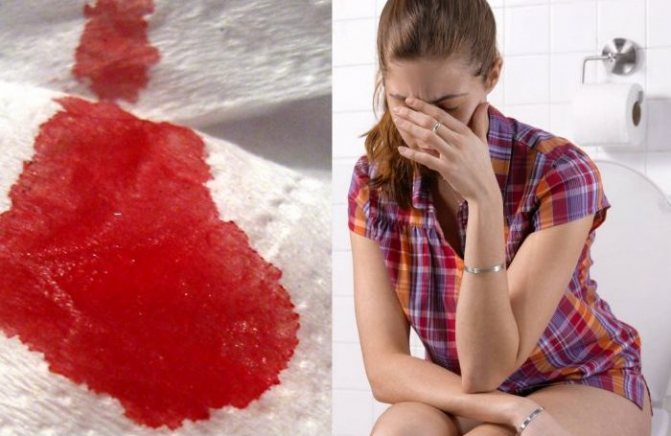
Also, bile can be observed in the mucus, which most often indicates damage to the liver and gallbladder. Of particular danger are discharges of a jelly-like consistency mixed with pus. The color of stool in liver pathologies may acquire a lighter color.
Before treating any pathology, it is necessary to visit a specialist and undergo a series of laboratory tests, as well as diagnostic procedures.
Diagnostics
To find out the main cause, make a diagnosis and prescribe therapy, you need to contact a coloproctologist. To establish the true causes of mucus discharge from the anus, palpation and examination of the anamnesis are not enough. It is necessary to conduct an instrumental examination of the intestines, take a general analysis of stool and blood, and, if necessary, do an endoscopic or x-ray examination of the gastrointestinal tract.
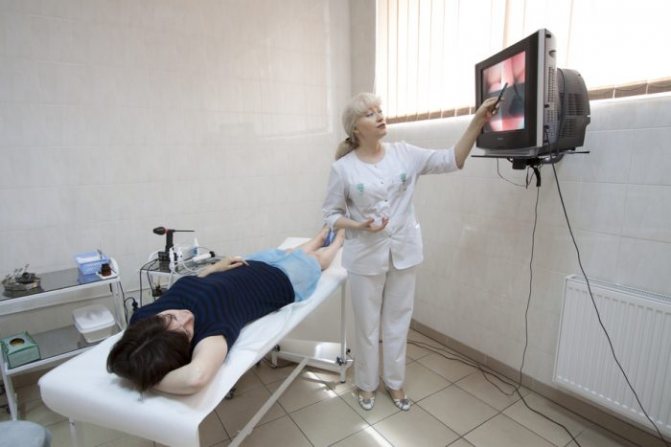
Therapy
The main method of treatment depends on the cause of the discharge. In the presence of an acute inflammatory process and the presence of infectious pathologies, antibiotic therapy is necessary. If the cause of the appearance of fluid is hemorrhoids, then first of all it is necessary to eliminate the inflammation, and then begin direct treatment of the underlying pathology. Various types of neoplasms in the intestinal area require surgical removal.

Often, mucus can be a sign of a diagnosis such as dysbiosis, which can often be observed during pregnancy or in childhood. In such situations, medication is prescribed as therapy aimed at normalizing the intestinal microflora.
Mucous rectal discharge: normal or pathological?
The production of mucus in the intestines is a function of glandular cells that are located in the gastrointestinal tract. The main task of mucus synthesis is to facilitate the removal of feces from the rectum.
When mucus is released during hemorrhoids, one can judge the pathological condition, since any consistency of the liquid is not normal.
Most often, excess mucus synthesis during hemorrhoids and its penetration outward is accompanied by uncomfortable conditions:
- pain in the abdominal area;
- diarrhea or constipation;
- flatulence;
- filling of the intestines with gases;
- colic.
In later stages of hemorrhoids, mucus appears with blood or pus. Initially, the fluid becomes noticeable only during bowel movements, but as the condition progresses, the risk of involuntary discharge increases.
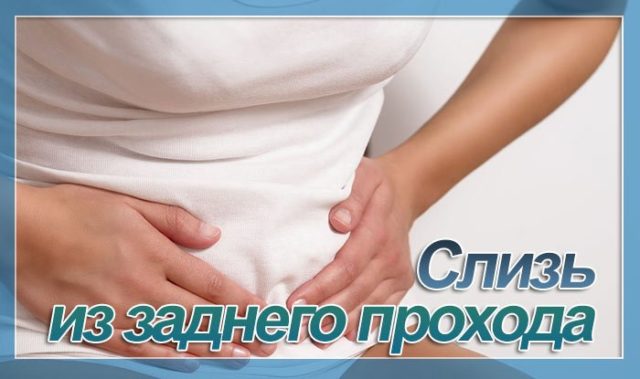
Anal discharge in men and women is a delicate problem.
areas
Smecta will help with diarrhea.
It is necessary to treat diarrhea with medications that can quickly improve the general condition of the body and eliminate unpleasant symptoms:
- First of all, you need to take sorbents. These are products that remove toxins from the body and also eliminate bloating. Doctors prescribe such drugs for poisoning and intestinal infections. Watery diarrhea is treated both with traditional activated carbon and with more innovative drugs (Smecta, Denol, Polyphelan).
- On the first day of diarrhea, it is recommended to take medications that help reduce mucus in the intestines and relieve inflammation (Diclofenac, Indomethacin).
- During the entire period of unpleasant symptoms, you can drink decoctions and infusions from medicinal plants that reduce intestinal secretion and motility. Chamomile, oak bark, cinquefoil root, and alder cones have such properties.
- If diarrhea occurs due to gastrointestinal disorders, then you need to take enzymes that promote greater production of digestive juices. To restore normal absorption functions, take medications containing pancreatin (Festal, Mezim).
- Drugs that help reduce intestinal motility, antidiarrheals. In this case, it is advisable to consult a doctor before taking anything on your own. If diarrhea with water appears due to an intestinal infection, then there is a risk that not all pathogenic bacteria will be eliminated from the body, some of them will remain in the intestines.
- When watery diarrhea is caused by an intestinal infection, antibiotics are usually not necessary. Antibacterial agents with a wide spectrum of action are prescribed when there is doubt that other methods will bring the desired result.
- Intestinal antiseptics - these agents have strong antimicrobial properties and act only in the intestines themselves and are not absorbed into the blood. Fires do an excellent job of fighting staphylococci, streptococci, and salmonella, without killing beneficial intestinal microflora. A drug such as Intetrix even destroys dysentery pathogens and candida fungi.
- Probiotics. In any situation, regardless of the cause of diarrhea, it is imperative to restore the intestinal microflora. In this case, medications such as Linex, Hilak-Forte, Enterol will help.
Read: Diarrhea during pregnancy, is it dangerous?
What does mucus discharge from the rectal canal indicate?
Mucus in the stool is a serious symptom that requires diagnosis and determination of the root cause of the condition. Only by knowing the source of the problem can the manifestation be cured.
Main reasons for allocation:
- haemorrhoids;
- taking expired or harmful products;
- ulcerative colitis;
- presence of fistulas;
- tumor enlargement;
- rectal ulcers;
- condylomas on the anus;
- herpes;
- various infectious intestinal diseases: tuberculosis, gonorrhea, yersiniosis;
- intestinal irritation;
- presence of inflammation: sigmoiditis, proctitis.
More often, mucus in the stool is found with hemorrhoids, but it can also be a symptom of other dangerous ailments. To prevent serious complications, you need to look for the problem under the guidance of a proctologist.
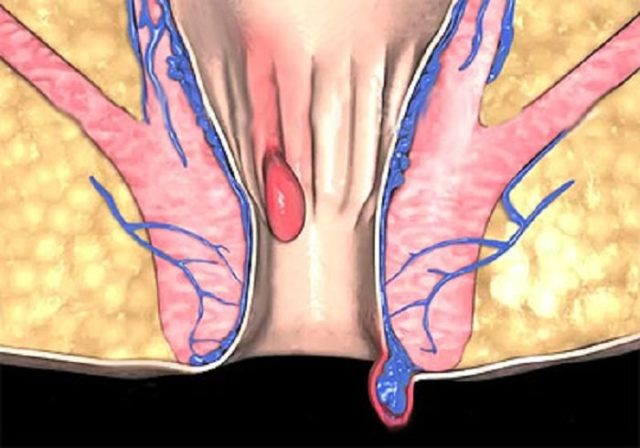
There are diseases that cause people discomfort and prevent them from living a normal life.
What are the pathological discharges from hemorrhoids?
Mucus and itching in the anus are characteristic symptoms of hemorrhoidal disease. Due to the contact of mucus and skin, irritation develops between the buttocks. If treatment is delayed, there is a risk of ulcers and erosion.
The stage of development of hemorrhoids determines what kind of discharge there may be and the risk of additional manifestations. Mostly bleeding occurs in severe conditions, when there is severe itching, pain, burning sensation and a feeling of partial bowel movement.
What types of discharge are there for hemorrhoids?
- clear mucus indicates the relative health of the body. If there is a slight increase in its quantity, it is not necessary to immediately consult a doctor if hemorrhoids were previously diagnosed;
- cloudy or with different colors - this is a manifestation of a pathological condition; complications appear in the body, which require timely contact with a proctologist;
- with red color. Such discharge from internal hemorrhoids may indicate rupture of nodes; this condition should be reported to your doctor.
In the presence of foam, there is a high risk of inflammatory infectious disease. Some infections of the reproductive system may result in foamy fluid, but the typical symptom is discomfort in the groin or genital area. The appearance of yellow spots may indicate damage to the gallbladder or liver, which leads to bile leakage. With liver disease, stool becomes light in color.
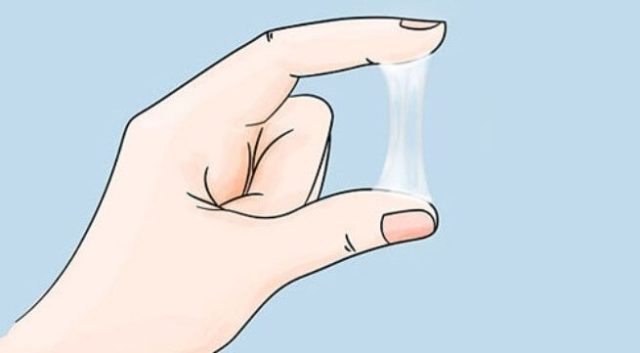
Mucous discharge from the anus in men and women is always a consequence of some proctological disease
Is it normal for hemorrhoids to have mucus? This is a specific symptom of the disease; if there are no impurities in the liquid and it is transparent, then the condition is controllable, it can be attributed to the characteristic behavior of the disease. Despite the frequency of occurrence of the problem, it needs to be treated, because the secretion of mucus indicates a weakening of the anal muscles.
Fluid in the anus due to hemorrhoids
In 9 out of 10 cases, an unpleasant symptom indicates the development of a disease such as hemorrhoids. These are varicose veins in the lower intestine and anorectal area. It is mainly diagnosed in middle-aged and older people, disrupting the usual rhythm of life and complicating the process of emptying. In recent years, doctors have noted a sharp rise in pathology. This is facilitated by a “lazy” lifestyle, lack of physical activity and the high level of comfort of a modern person.
IMPORTANT!
Hemorrhoids are more often observed in people who are obese and work most of the time in a sitting position. When the functions of the circulatory system in the lower intestine are disrupted, the veins are compressed by the surrounding soft tissues. When you change position or strain, they are exposed to an influx of blood and stretch. This is how inflamed areas are formed, which intertwine into hemorrhoids.
In the first months, the patient may not feel the formation of such inflamed lumps in the intestines. He attributes the heaviness and problems with bowel movements to a passion for fatty foods or fashionable diets, or fatigue from work. At the initial stage, hemorrhoidal plexuses are small in size, so the symptoms are hardly noticeable. With an increase in the volume of blood, which is retained and accumulates in the lump, internal pressure increases. In addition, feces can damage the protruding neoplasm and injure it with solid particles.
All these reasons lead to the appearance and release of inflammatory fluid. It has a sticky texture and is often released when external hemorrhoidal bumps are touched or scratched. Contact with skin or intestinal mucosa causes severe irritation. The patient is concerned about itching and burning in the anorectal area, redness and swelling around the sphincter.
The appearance of such exudate is usually accompanied by more serious symptoms:
- acute pain during bowel movements;
- sensation of a foreign body in the anus;
- bleeding when straining or carrying heavy objects;
- stool disturbances in the direction of prolonged constipation;
- voluminous bumps on the skin near the sphincter.
When does mucus and blood occur with hemorrhoids?
Bloody discharge from hemorrhoids occurs when there are internal lumps that are damaged under the pressure of feces. An alternative reason is the presence of injuries from dropped nodes.
The appearance of blood in the anal discharge during hemorrhoids is associated with the process of bowel movements. The nodes begin to bleed during bowel movements or after eliminating the contents of the intestine.
The amount of fluid produced by hemorrhoids may vary depending on the severity of the disease. Drops of blood become visible on the surface of the stool or on toilet paper. Sometimes the condition worsens until a stream of blood is detected.
Based on the color of the blood, one can judge the location and cause of the discharge:
- dark brown or black clots are a sign of completed bleeding. The symptom is dangerous, since the source can be not only in the rectum, but also in the stomach due to recurrence of the ulcer;
- scarlet, red liquid is a manifestation of an open wound that bleeds during bowel movements. It is a more common symptom.
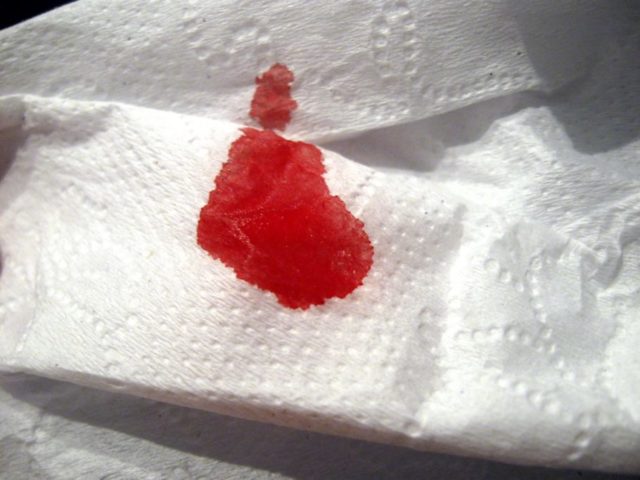
Bloody discharge from the anus with hemorrhoids may indicate cancerous tumors in the large intestine.
The condition can be determined or excluded based on other symptoms:
- pain in the intestinal area;
- flatulence;
- exhaustion of the body, a person quickly loses weight;
- a noticeable change in the condition of the stool, it becomes thinner and has a ribbon-like shape.
Diet for diarrhea
Rice water will reduce intoxication.
It is very difficult to eliminate the signs of diarrhea without special nutrition. For acute flows, you only need to drink a lot of water and infusions that have astringent properties.
Only when the intoxication decreases and the patient’s condition improves slightly can the following products be included in the diet:
- Rice water;
- Crackers
- Fruit and berry jelly
- Porridges with enveloping properties
- Low-fat fermented milk products
Over time, all familiar products are gradually introduced into the menu, however, you need to monitor your condition and not introduce more than one product into your diet per day. During the period of diarrhea, it is prohibited to consume:
- Sweet bakery products
- Full fat dairy products
- Very sour fruits and berries
- Fatty fish and meats
- All canned vegetables
- Radish, cabbage, white turnip, cucumbers, beets.
It should be remembered that you can only eat light and easily tolerated foods. All recommendations are general in nature. There are exceptions that depend on the individual characteristics of organisms that react differently to a particular product.
What does mucus discharge from the anus indicate?
If a patient experiences anal discharge, this is a cause for concern. Discharge can be a symptom of neoplasms or a variety of diseases of the rectum:
- fistula;
- inflammation and ulcers of the colon mucosa (colitis);
- hemorrhoids;
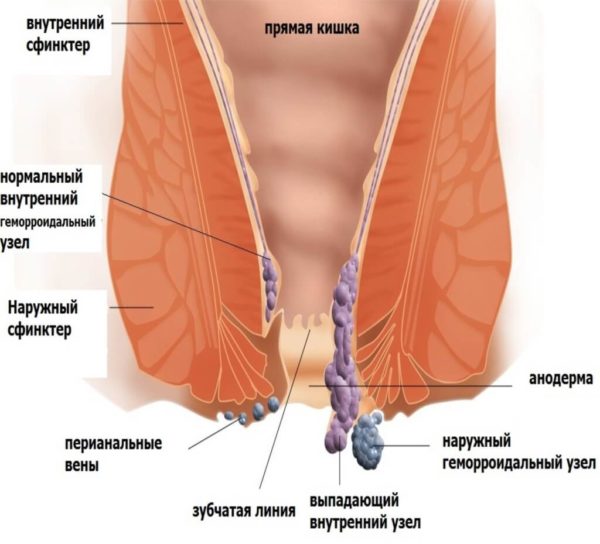
Hemorrhoids are venous expansion of the choroid plexuses of the rectum
Oily fluid comes out of the anus
The most typical cause of such discharge is the abuse of fried and fatty foods. The norm of fat for an adult weighing 70 kg is about 80-90 g. For men, this figure may be slightly higher (about 95 g). Persons with increased body weight, as well as those prone to obesity, can consume no more than 60-65 g of fat per day, while half of the daily intake should be fats of animal origin (fatty fish, meat, butter). If a person consumes too much fat, droplets of an oily liquid without a distinct odor may be released from the anus.

Fatty and fried foods are one of the main reasons
Another reason for such discharge is the use of drugs from the group of lipase inhibitors, a water-soluble enzyme involved in the processes of breakdown and digestion of lipids. Medicines in this group include:
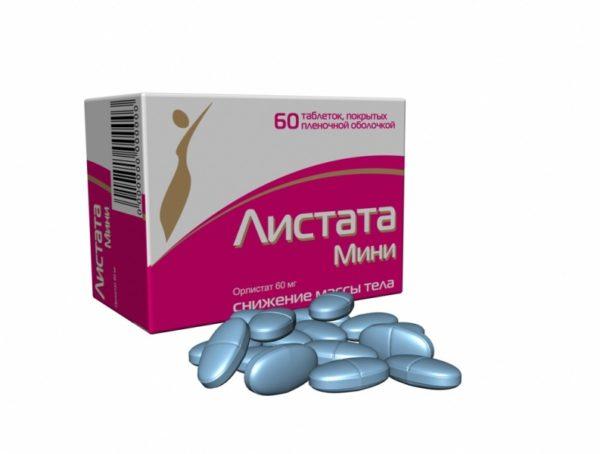
These drugs block the absorption of lipids, and all the fat that enters the body with food is excreted unchanged in the form of an oily liquid of a rich yellow color, which leaves stains on underwear that are difficult to wash off. These medications are used to treat obesity and can only be used as prescribed by a doctor, since in some cases (for example, with bile stagnation) they are contraindicated.
Note! The appearance of oily discharge from the anus in diseases of the colon is a rare symptom, but sometimes inflammatory processes in the sigmoid and colon can occur against the background of similar symptoms. In isolated cases, yellow thick drops from the anus may appear due to inflammation of the gallbladder or pancreas.
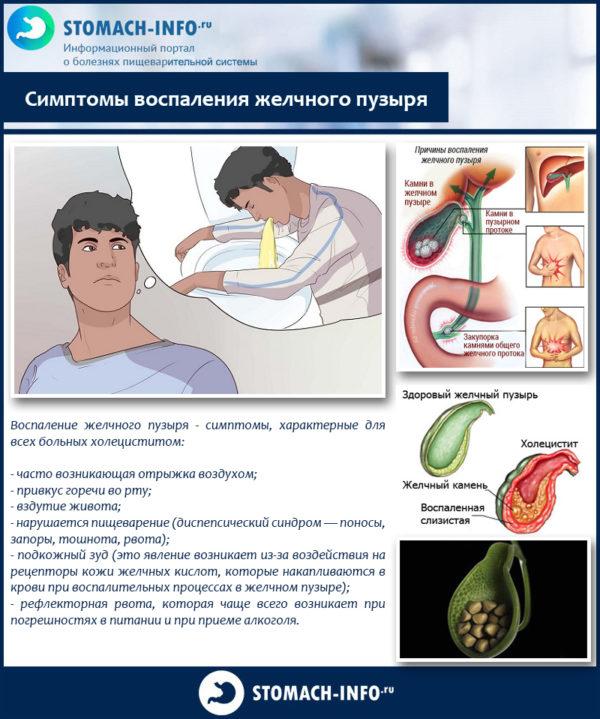
Symptoms of gallbladder inflammation
What are the pathological discharges from hemorrhoids?
Discharge from the anus with hemorrhoids is of a different nature:
- At the initial stage, the mucus that appears may be transparent. This indicates the absence of complications, but the presence of pathology;
- If you notice that the discharge is cloudy, then most likely the disease itself is worsening. And against its background, new inflammatory processes may develop;
- if mucus appears with blood, then the patient has damage to the hemorrhoid. In such a situation, you should immediately consult a doctor. Otherwise, a serious aggravation may begin;
- During bowel movements, patients sometimes notice purulent inclusions in the stool. This is a very alarming signal.
Causes of purulent discharge
Although it is normal for the colon to produce mucus, a macroscopically visible amount of mucus in the stool is not normal, especially if the mucus is mixed with pus or blood. This situation is typical for inflammatory processes of specific and nonspecific types, with:
- food poisoning;
- infectious intestinal diseases;
- intoxication of the body with toxins;
- poor nutrition (predominance of fatty, salty, smoked, pickled foods in the menu);
- intestinal dysbiosis;
- ulcerative colitis;
- Crohn's disease;
- coccyx cyst;
- neoplasms of a benign or malignant nature;
- pararectal fistulas;
- chronic abscess in the lumen of the rectum;
- hemorrhoids (most often, pus is released during advanced stages of hemorrhoid development due to thrombosis of hemorrhoids or inflammation of the perirectal tissue);
- postoperative complications.
If there is increased secretion of mucus with pus or blood from the anus, you should immediately consult a doctor. Pus in the anus is a symptom that should never be ignored.
When does mucus and blood occur with hemorrhoids?
Since mucus is normal for hemorrhoids, a more alarming sign would be the appearance of blood in it. The discharge itself is produced by the intestinal mucosa and around the nodes due to the inflammatory process. Blood impurities appear when the cones themselves are injured.
Damage may be caused by bowel movements, especially if constipated. If stool sits in the intestines for a long time, it begins to harden. Very dense fecal masses are formed. They can damage not only the thin layer on the nodes, but also the intestinal mucosa itself. If the mucus has a faint scarlet character, then the damage is insignificant. But if it is painted in bright red tones, then this is a reason to worry.
With severe damage, active bleeding may begin. There may be a slight loss of blood, but there is a risk of infection and complications of the disease. You shouldn't wait and hope that everything will heal on its own. Seek professional help from a proctologist. It is advisable to carry out infrared coagulation.
Using an anoscope, the photocoagulator acts with infrared rays on the node and its base. The heat generated from the device causes the damaged surface to curl. This procedure is a reliable, quick and painless method of stopping bleeding of rectal nodes.
Mucus in children
In children, due to unformed intestines and poor nutrition, irritable bowel syndrome may occur, which provokes the appearance of mucus. Also, unpleasant discharge indicates inflammatory processes in the intestines and dysbacteriosis.

Mucus without feces in a child occurs with parasitic helminthic infestation, volvulus, intestinal obstruction, prolonged constipation, or the presence of a foreign body in the intestines.
When do purulent mucous inclusions occur with hemorrhoids?
In addition to bloody mucus, patients sometimes experience purulent discharge from the anus due to hemorrhoids. They are most noticeable when enveloping feces. These may be symptoms of various complications of the disease or background pathogenic processes:
- thrombosis of hemorrhoids;
- parorectal fistula;
- ulcerative colitis;
- abscess.
All of the above reasons entail serious consequences. It is necessary to undergo examinations and find out the exact cause. Timely treatment will help avoid sepsis and necrosis.
Discharge from the anus in women occurs for the same reasons as in men. They do not have separate prerequisites.
Bloody issues
Even minor bleeding from the anus should be a reason to visit a doctor, since normally a person should not have such symptoms. The most common disease that can cause bleeding from the anus is hemorrhoids. The prevalence of this disease is about 60-80%, so today there is sufficient experience in the successful conservative treatment of hemorrhoids without the use of surgical techniques.
Blood in the stool may also indicate helminthic infestation, anal fissures, and severe inflammatory processes. When prescribing a complex of primary diagnostics, the doctor must conduct a differential examination to exclude various tumors. Benign tumors of the rectum (polyps, cysts) can manifest as moderate bleeding between bowel movements, but more often these pathologies are asymptomatic. Malignant tumors can bleed at stages 3-4 of colorectal cancer, so even in isolated cases of bloody discharge from the anus, no time should be wasted: only timely detection of certain diseases can guarantee a successful outcome of the treatment. Why there is a coating on the tongue, you will find the answer in the link.
Discharge from the anus in men and women is a delicate problem, but the sooner the cause is known and treatment is started, the greater the chance of maintaining health and quality of life.
If the intestines are healthy, there should be no discharge outside of the act of defecation.
In recent years, there has been a tendency towards an increase in proctological morbidity.
So, when is it necessary to urgently make an appointment to get tested?
Can there be mucus after hemorrhoid surgery?
Some patients wonder: what causes mucus after hemorrhoid surgery? Discharge from the anus after surgery is rare. This complication is caused either by non-compliance with postoperative recommendations or by infection. As a rule, operations are minimally invasive. They leave no open wounds through which infection could enter.
Mucus or pus after hemorrhoid surgery often appears due to pathogenic microorganisms entering the body through feces. This mainly occurs with internal hemorrhoids. Especially if the patient neglects necessary hygiene. In the postoperative period, the anus requires very careful care.
After defecation, be sure to use wet wipes or a bidet. It is advisable to eliminate hard toilet paper for a while. If purulent discharge occurs due to hemorrhoids, doctors install drainage to pump out the resulting inflammation. In parallel, treatment is carried out with topical and external antibiotics.
If after hemorrhoid surgery there is a mucus mark on paper or underwear, you should immediately inform your doctor. If you take medications on time, you can prevent unpleasant complications.
Prevention of exacerbation of hemorrhoids
Even properly selected treatment does not guarantee that the disease will not make itself known again after a while with the appearance of a transparent liquid secretion from the anus. For good results, you should pay attention to prevention and follow the instructions of the proctologist:
- Switch to a diet that is rational and easy on the intestines. Cereal porridges, some legumes, vegetables, herbs and fermented milk products help improve peristalsis. It is better to steam or stew dishes, season with vegetable oils.
- Drink more regular water, forget about sweet carbonated drinks.
- Spend your free time more actively, go to the pool or walk with friends in the park.
- Choose an interesting hobby such as yoga, Pilates or dancing.
- When working sedentarily, get up every 30-40 minutes and stretch your pelvis, walk up the stairs.
- Once every six months, take a course of venotonics to strengthen blood vessels.
How to treat hemorrhoids with mucus discharge from the rectal canal?
The appearance of mucus is a symptom and one of the manifestations of the disease. Its presence is the norm. Therefore, treatment will be the same as for the standard course of the disease.
Treatment of hemorrhoids depends on the stage of its development. There are four stages in total. Each of them has its own complications. As a rule, the first and second stages can be treated with medication, without surgery. The doctor prescribes a comprehensive treatment, including:
If all recommendations are followed and the causes of the disease are excluded, the nodes will resolve. However, in the third and fourth stages it will not be possible to do without surgery.

Rectal suppositories for the treatment of hemorrhoids
Necessary treatment
If mucus or water comes from the anus, you need to urgently consult a doctor and treat the pathology that caused such a symptom. To begin with, the patient needs to review the diet and, in case of disorders in the gastrointestinal tract, limit spicy, salty fried foods. You should also eat more fiber-rich foods.
If hemorrhoidal deviation, thrombophlebitis, or intestinal inflammation are diagnosed, then drugs that normalize stool are prescribed:
If bloody fluid comes out of the anus, then special medications should be taken to stop the bleeding. Also, in complex therapy, anti-inflammatory drugs and pain-relieving drugs are indicated. It is necessary to take medications that tone the veins and constrict blood vessels. For this purpose, doctors often prescribe Phlebodina 600, Detralex and other drugs. In especially severe cases, for cancerous tumors, surgery and a course of chemotherapy are indicated, only after this the unpleasant symptom will disappear. Therefore, in order not to aggravate the situation and provoke complications, it is necessary to conduct a timely examination of the anal zone and treat the disease in the early stages of development.


